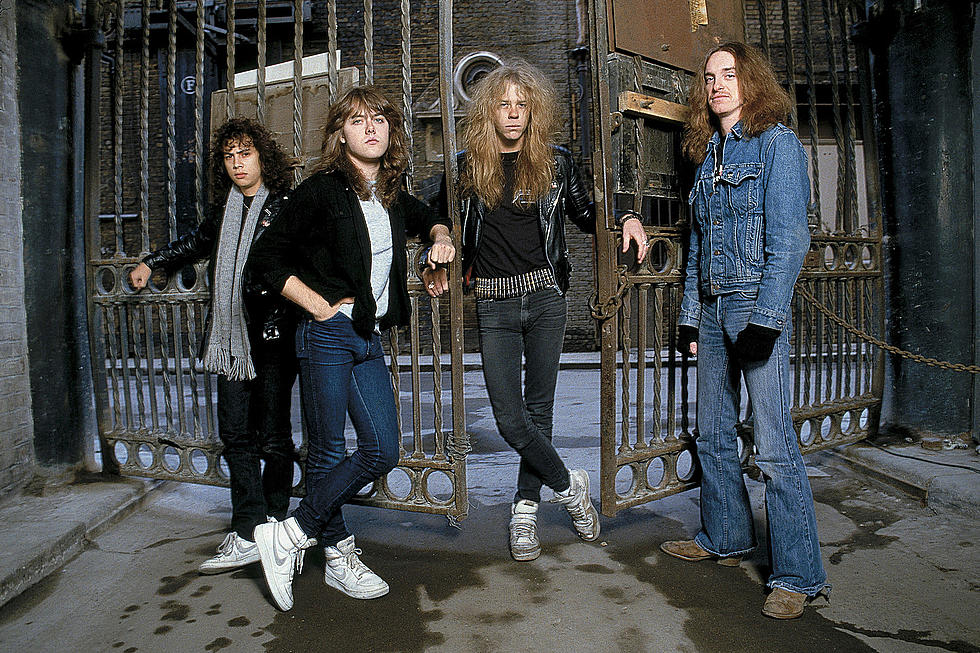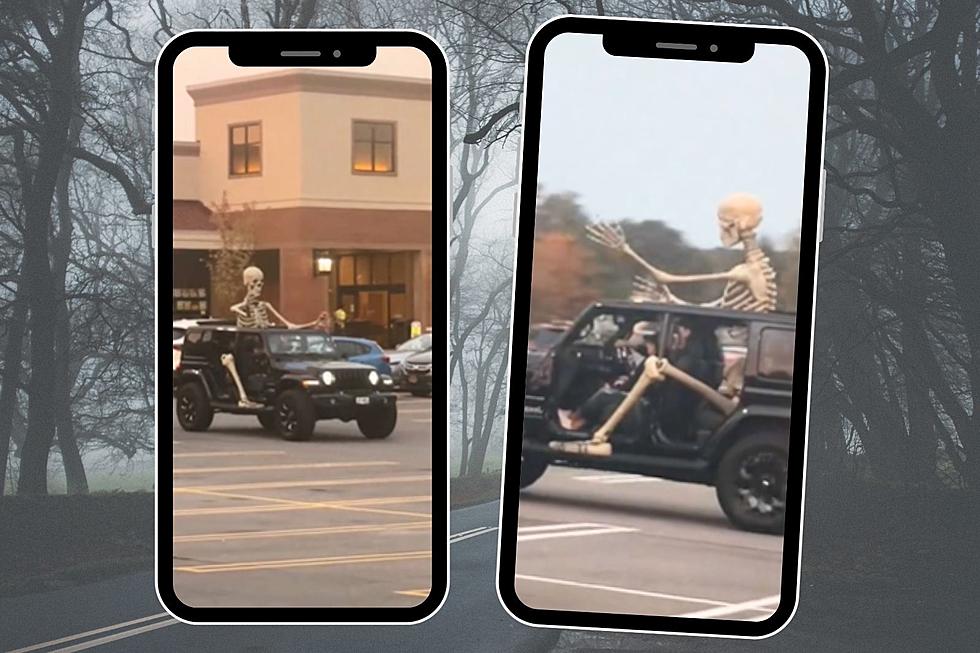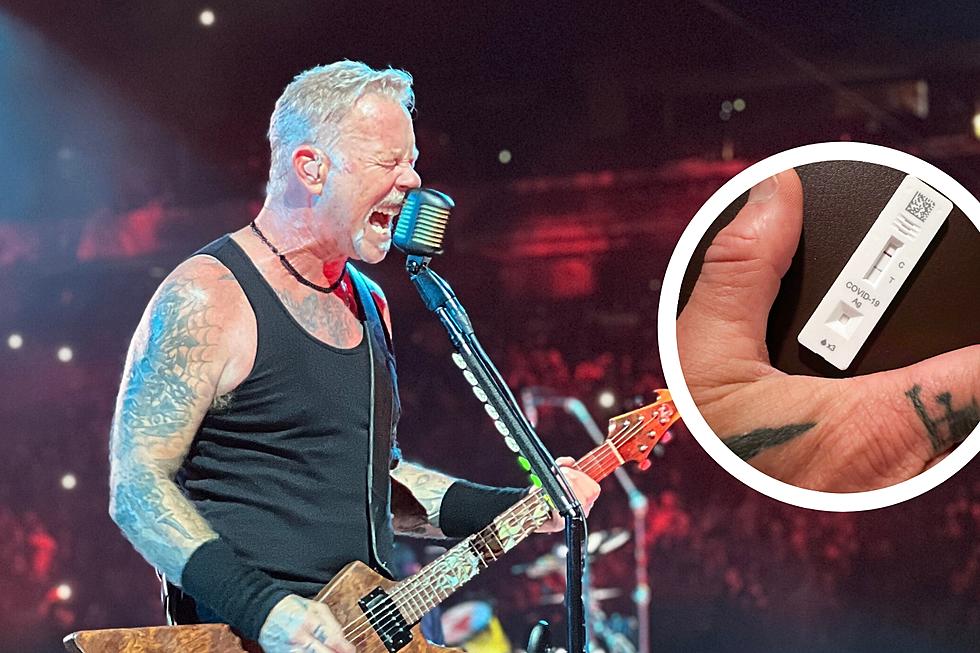
Metallica’s ‘Ride the Lightning': 10 Facts Only Superfans Know
Metallica were still part of the underground thrash scene in the early '80s when their debut album Kill 'Em All came out, but they really began to establish themselves once Ride the Lightning was released in 1984.
Regarded as a huge step forward for the band in terms of musical composition and lyrical maturity, Ride the Lightning featured much more complex structures and socially aware themes than its predecessor. The lineup was finally solidified, following a revolving door of musicians, and they released their first ballad, "Fade to Black." Metallica, little did they know, were well on their way to superstardom.
James Hetfield, Kirk Hammett, Cliff Burton and Lars Ulrich shared their second creation with the world on July 27, 1984. All these years later, Metallica are still on top of the world. Here are 10 facts you may not have known about Ride the Lightning.
1. It was released twice.
Ride the Lightning was initially released through the independent label Megaforce Records in the U.S. and Music for Nations in Europe. It sold 85,000 copies across both markets, and then Metallica signed with Elektra Records, who reissued the album. It ended up peaking at No. 100 on the Billboard 200 without any radio exposure at all, and was eventually certified six times platinum.
2. The title is connected to Stephen King.
The name was inspired by a passage in Stephen King's The Stand, which Kirk Hammett had been reading around that time. "There was this one passage where this guy was on death row said he was waiting to 'ride the lightning,'" the guitarist told Rolling Stone. "I remember thinking, 'Wow, what a great song title.' I told James, and it ended up being a song and the album title."
3. There was a swap in songwriting credits.
Ride the Lightning was the last Metallica album to feature songwriting credits from Dave Mustaine, who went on to form Megadeth after he departed. In addition, it's the first Metallica album to feature songwriting credits from Mustaine's replacement, Hammett.
4. The composition of the music was more complex, thanks to Cliff Burton.
Kill 'Em All was often criticized for lacking complex musical composition, so Cliff Burton, who wasn't very involved in writing their debut, taught his bandmates about music theory when it came time to work on its follow-up. The bassist had a formal background in music from studying it in college.
"Cliff went the whole length and learned musical theory and everything," Hammett reflected in an interview with Guitar World. "And he was way into harmonies. James really absorbed the dual-harmony thing and took it to heart. He made it his thing, but it was originally Cliff’s. Cliff also inspired James greatly on counterpoint and rhythmic concepts.”
5. Recording in Denmark made them homesick.
Thanks to Lars Ulrich's connections, the band was able to record the album in Denmark. After a couple of weeks, they started to feel a bit homesick. "It was easy for the Danish guy to fit in, but it wasn’t so easy for the three American guys to fit in. We were experiencing culture shock a little bit," Hammett admitted to Rolling Stone.
"We didn’t really have anything else to do besides work on music and drink Carlsberg beer," he continued. "Being homesick gave us the right amount of, I don’t want to say 'depression,' but a little bit of longing that I think made its way into the recording process.
6. Their producer had never heard of them.
In Denmark, the band worked with producer Flemming Rasmussen at Sweet Silence Studios because Ulrich was a fan of his work on Rainbow's 1981 album Difficult to Cure. Rasmussen had not even heard of Metallica before working with them, but ended up producing Master of Puppets and ...And Justice For All.
"I had never heard of [Metallica], but I really liked them as people," the producer later said during the Rolling Stone interview. "My mentor was really into jazz, and he pulled me aside one day and said, 'What’s going on with these guys? They can’t play.' And I’m like, 'Who cares? Listen to the energy.'”
7. James Hetfield almost didn't sing on it.
Hetfield didn't want to play guitar and sing on the album, so the band offered the vocalist duties to Armored Saint singer John Bush. He declined the opportunity because his band was doing well at the time, so Hetfield just decided to do both again.
“Do I regret turning that down? What I always tell people is that Armored Saint was developing and we were doing well, and these guys were my buddies, you know?" Bush told Metal Hammer of his decision to turn Metallica down. "Metallica were doing well, but it wasn’t like it was Metallica in 1987. It was a few years before that. So, I didn’t want to leave my band. I liked them and I still do!”
8. Ernest Hemingway's For Whom the Bell Tolls inspired the song of the same name.
Metal fans hear the name For Whom the Bell Tolls and immediately think of the Metallica song, but it was actually inspired by Ernest Hemingway's 1940 novel with the same name, which was about the Spanish Civil War. The lyrical content of the song refers to a specific chapter in the book, which details El Sordo and four soldiers are killed while attempting to fight on a hilltop.
"Take a look to the sky just before you die / It is the last time you will / Blackened claw massive roar fills the crumbling sky / Shattered goal fills his soul with a ruthless cry"
9. "Fade to Black" was inspired by a series of unfortunate events.
"Fade to Black" was one of the first ballads Metallica had ever written, and featured themes of depression and suicide. When Hetfield wrote the lyrics, they were pretty personal for him at the time. The band's gear was stolen prior to a show in January of 1984, in which Anthrax lent them some of their own equipment.
"When ‘Fade to Black’ was originally written, this was real. Like, ‘I fucking hate life. Our gear just got stolen, we can’t live our dream, we’re not gonna make it to Europe,‘ all these things," the vocalist recalled in a So What! video interview.
The singer, however, also revealed the new meanings the song has taken on for him over the years. "And then, obviously, when Cliff or somebody important in our lives passes, that song pops up. Or like Chris Cornell, Dio... Someone’s passing gives that song new life for me."
10. They don't care for "Escape."
Metallica didn't play "Escape" until 28 years after Ride the Lightning came out. They performed it for the first time at Orion Festival in 2012, when they performed the album in its entirety. Hetfield introduced it as "the song we never wanted to play live, ever."
"At the time we thought we’d write a song that was a little more accessible and melodic and less metal and grinding. It was also in the key of A, which is pretty rare for us. 'Escape' was also the last thing written in the studio," Hammett admitted to Guitar World. "The song was pretty much an attempt to write something that would get radio’s attention. But it never really happened for us. They ignored that song… along with everything else!"
Metallica: All Their Songs, Ranked
More From Ultimate Metallica










